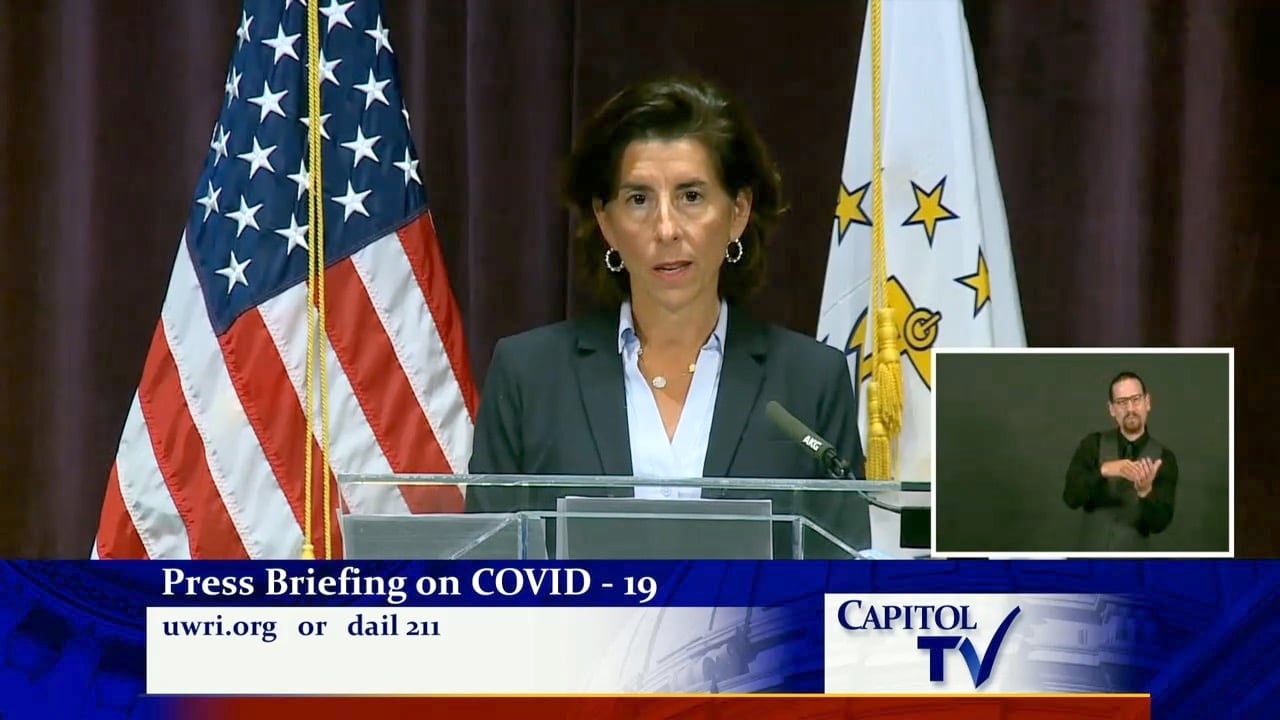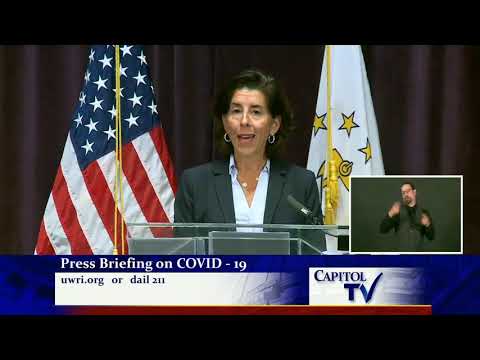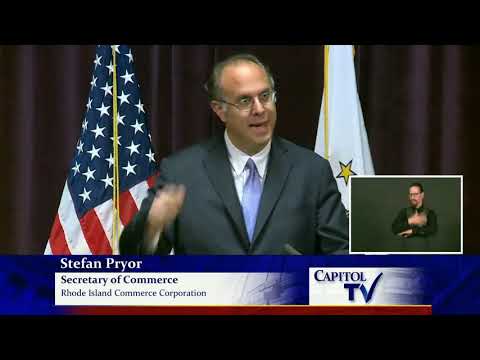Governor unveils new eviction diversion program, but will landlords allow tenants to utilize it?
Pryor noted that under the Safe Harbor Housing Program both the tenant and the landlord have to agree to the enter mediation program. “Why would the landlord agree to a free lawyer for the other side, given that right now they have all the power? They’re giving up a huge advantage,” asked Uprise RI in a follow up. “Today I
July 11, 2020, 11:36 am
By Steve Ahlquist
Pryor noted that under the Safe Harbor Housing Program both the tenant and the landlord have to agree to the enter mediation program.
“Why would the landlord agree to a free lawyer for the other side, given that right now they have all the power? They’re giving up a huge advantage,” asked Uprise RI in a follow up.
“Today I am very pleased to announce that that next week, in coordination with the Rhode Island District Court, which is the court that handles evictions, and United Way, we will be launching an eviction diversion effort that we’re calling the Safe Harbor Housing Program,” said Rhode Island Governor Gina Raimondo at Friday’s COVID-19 press conference. “It is my hope that this initiative will serve as an alternative to a traditional eviction process. It will provide landlords and tenants an opportunity to work towards a solution outside of the court system to avoid evictions. We’ll be directing $7 million of our CARES Act funding to this effort and we expect that that $7 million will be able to support at least a thousand folks, probably closer to 1500 or 2000 Rhode Islanders so that they can maintain stable housing.”
Here’s how the Safe Harbor Housing Program will work, according to the Governor’s press release
- Renters who meet income criteria and are behind on their rent because of the COVID-19 emergency will be able to qualify for assistance. Tenants can apply directly, or landlords can apply on behalf of tenants who need help getting back on their feet. Starting Monday, you can contact United Way and ask about the Safe Harbor program to start the application process. (Once the program launches on Monday, you can go to the United Way website, www.uwri.org, or call 211 to apply.)
- If both parties agree to participate, they’ll be contacted by a United Way housing specialist to finalize a payment agreement supported by CARES Act funding. Tenants who need legal advice will be able to access free legal services.
- To be clear, you can apply to participate before you receive an eviction notice, if you don’t think you’ll be able to catch up on the rent you owe. We want to resolve these situations early to the extent possible.
The Governor acknowledged that this program is only response to what many categorize as an unfolding eviction epidemic, adding, “is obvious that $7 million, although it will keep a thousand or two thousand families in their homes, is not going to solve the whole problem. But I also know there are families struggling right now and we have to help them. They need help right now. This an immediate action step meant to make sure that folks stay in their homes. I said earlier, I suspect that as this unemployment situation drags on, as the courts are opened for evictions, we’re going to get a better picture of how big the housing problem is, and we’re going to come back and we’re going to continue to address it. This is meant to immediately provide relief to our most vulnerable families and be there for them so they don’t wind up homeless.”
The Governor reiterated her call or the the Rhode Island General Assembly to pass legislation that will make it illegal to deny someone housing based on their source of income, and also aked for the General Assembly to do more to address the issue of affordable housing.
Under questioning, Raimondo deferred to her Secretary of commerce, Stefan Pryor.
Michael Bilow of Motif Magazine pointed out that previous housing relief programs put forth by the Raimondo Administration excluded many in poverty because, for example, a lease was required in order to participate and secure government monies. “Of course, the probability of someone being on a month to month arrangement rather than a lease is much greater if they are in lower income situations.”
“There are federal rules that attach to the use of federal funds,” said Pryor. “For the new eviction program, we are providing flexibility that pertains to the kinds of cases that can arise and be assisted through the program.”
Under the initiative of Rhode Island District Court Chief Judge Jeanne LaFazia, “the court will actually be enabling the sending of information regarding the new Safe Harbor program when the five-day demand notices go out,” said Pryor.
Pryor called this an example of “creativity and flexibility” on the part of the District Court and the new program, saying, “if we simply waited for the moment of eviction, you’d lose great numbers of Rhode Islanders who would already be in trouble and not have anything to resort to.”
Uprise RI asked if the free legal help is available to anyone, or just those who opt into the program. Right now, in Rhode Island there is no law that allows someone facing eviction to access a free lawyer. This means that many families facing eviction go to court against landlords who have hired experienced eviction lawyers and are quickly overwhelmed legally.
Pryor noted that under the Safe Harbor Housing Program both the tenant and the landlord have to agree to the enter mediation program.
“Why would the landlord agree to a free lawyer for the other side, given that right now they have all the power? They’re giving up a huge advantage,” asked Uprise RI in a follow up.
“One of the reasons is that – I don’t want to overstate or understate the court’s involvement, the court should speak for itself – but the court and we are simultaneously providing this information as a gesture and as an indicator of what we collectively believe is the right path for many of these cases,” said Pryor. “Which is to try this informal method – you might call it informal mediation, it’s shy of formal mediation – so both tenants and landlords would be well advised to follow the pathways that are being recommended by both the executive and the judiciary branches in that sense – not a formal recommendation from the court.”
“But the courts say they don’t get the five-day and 30-day notices, so how would they use that to communicate?” asked Channel 12’s Ted Nesi.
Pryor noted that is true, but also “ideal.”
“Because what you want is the attorney, representing the landlord, to be forwarding this information with the five day notice,” said Pryor. “And that’s what the court will be requesting of attorneys that appear before them. So this is better than the court’s involvement in that you are in advance of the court having to be involved at all in the case.”
Presumably, if the case comes to an eviction proceeding before the court, the judge, at their discretion, could ask to see the result of the attempt of the informal mediation process, added Pryor.
“But lawyers are not required to send this information, they are requested to,” asked UpriseRI.
“Correct,” said Pryor.
“So there will be some tenants who will not see this information, theoretically,” asked UpriseRI.
“Correct, and what you’re pointing out is – The likelihood is very high that the information will be out there and one of the things we’re doing today is ensuring it’s even more widespread than individual notices.
“But having said that. you’re once again pointing out something that gets to the Governor’s bigger point which is that we may need more legislative measures to remedy the eviction problems endemic to Rhode Island and frankly, facing the rest of the country,” said Pryor. “There may be other legislative measures that we need to consider, if landlord cooperation and tenant participation don’t work out to be optimal. If we’re not seeing this work as well as we all collectively hope, we might have to do more…
“So let’s let this program play out a bit, let’s see if it does work. We’re optimistic that it will help a number of cases, and then we may have to turn to the legislature.”





